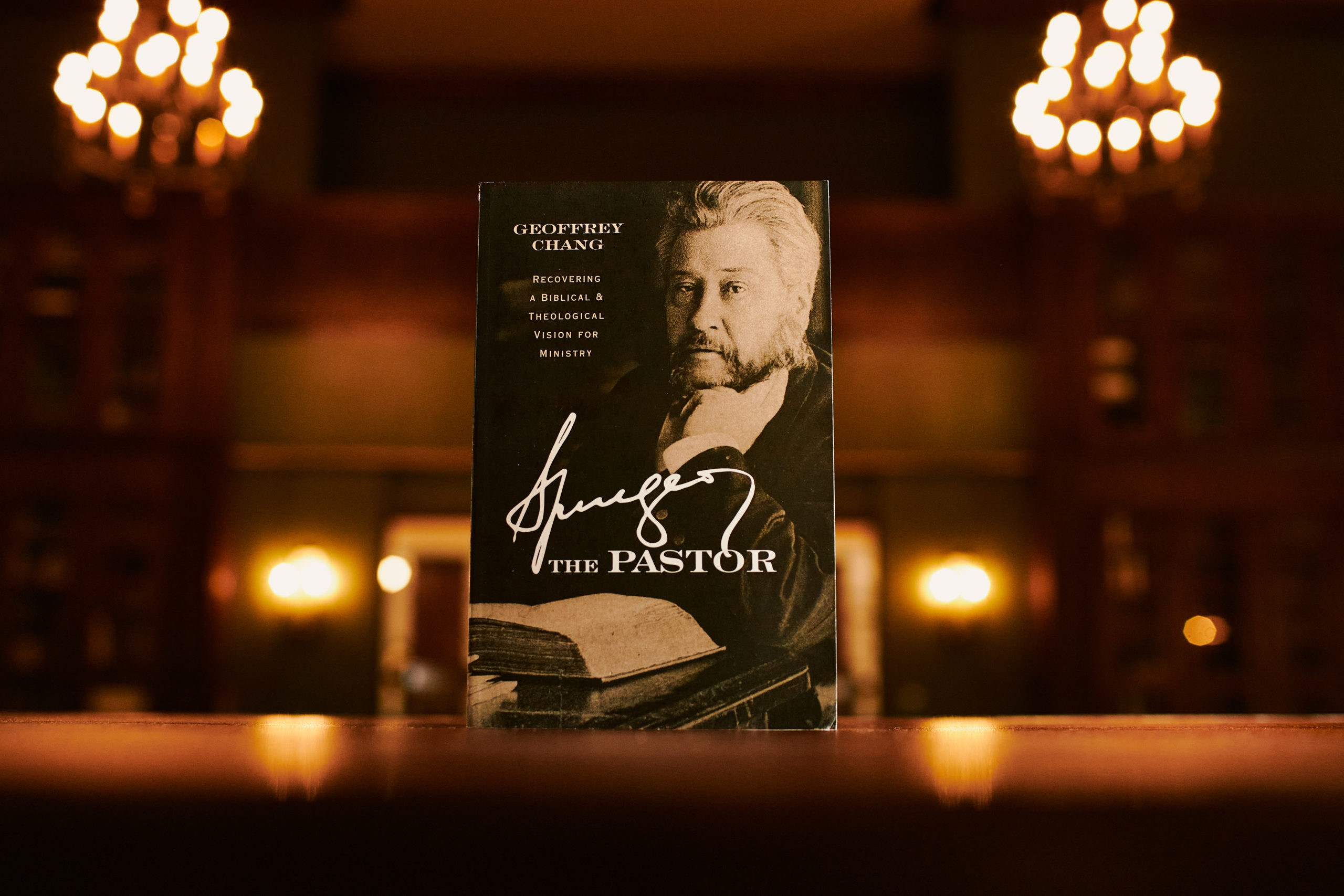
Geoff Chang serves as Assistant Professor of Historical Theology and Curator of the Spurgeon Library at Midwestern Seminary. In his latest book, Spurgeon the Pastor: Recovering a Biblical and Theological Vision for Ministry, Chang focuses on an often-overlooked aspect of Spurgeon’s life, his pastoral ecclesiology. He addresses topics such as church gatherings, baptism and the Lord’s Supper, church membership, congregationalism, pastoral training, and more.
In the book’s summary, Chang writes, “Charles Spurgeon, the Prince of Preachers, was a pastor to well over 5,000 people in a day long before “mega-churches” were the norm. But you might be surprised to know that Spurgeon’s vision for ministry was not pragmatic. He did not borrow best practices from the business leaders in his day. Rather, his ministry was decidedly, staunchly biblical and theological in nature- and it was a ministry vision we ought to adopt more than a century later.”
In a recent interview, Chang answered a few questions about his new book and the life and ministry of Spurgeon.
BF: Why should pastors and ministry leaders study Charles Haddon Spurgeon?
GC: The main reason is because Spurgeon sought to teach and apply what he saw in the Bible. My contention in the book is that Spurgeon was driven in his ministry by biblical and theological principles, rather than the latest fads or pragmatism. We may not agree with all his conclusions, but insofar as he sought to be faithful, he remains a model for us today. What’s striking about his ministry is that he pastored during a time of widespread nominalism, theological downgrade, but also remarkable revival. And yet in those challenging times, Spurgeon persevered in faithfulness to Scripture, both in his preaching and shepherding. And so, he is a worthwhile friend for us to get to know.
In the book, you give a comprehensive overview of Spurgeon’s pastoral ecclesiology, with each chapter focusing on a different aspect of his ministry. Through your studies, how would you summarize his philosophy of pastoral ministry?
One way to summarize Spurgeon’s philosophy of ministry would be that it was firmly rooted in his evangelical Calvinism. Spurgeon’s confidence lay not in human ability, but in God’s sovereign power to save, through the means that He has appointed.
Practically, this meant, first and foremost, that the faithful preaching of the Word was his most important duty. Because it is through the Word that God acts. It is through the Word that the lost are saved and the church is built up. As busy as he was with all kinds of other responsibilities, Spurgeon saw to it that his pulpit ministry never failed, but he preached excellent, faithful, gospel-rich sermons throughout his entire ministry.
However, Spurgeon knew that his preaching was only half of the work. If God is sovereign, then it is the duty of God’s people to pray. Apart from the prayers of the church, Spurgeon had little hope that his preaching would amount to anything. So he urged his people to pray and prioritized the weekly prayer meeting, along with numerous other prayer meetings throughout the week.
And then having prayed, Spurgeon urged his people to join him in proclaiming the gospel. We know much about Spurgeon’s ministry, but the church itself also became an engine for gospel ministry throughout London and into the rest of the world. All of this activity flowed from a robust confidence in God’s sovereign grace.
What may readers be surprised to learn about Spurgeon’s life as a pastor in this book?
My guess is that many readers will assume that because Spurgeon’s church was so large, it basically functioned more as a preaching station rather than a church. But this was certainly not the case. Spurgeon took seriously his calling as a pastor, and he took seriously the fact that they were a church. This means that even as the church membership reached 5,000, he was still thinking about how to keep track of his members, organize visitation, maintain meaningful membership, and much more. And all this before cell phones and email!
How have you seen the continued development of Spurgeon scholarship influence the lives of pastors, ministry leaders, and church members?
The latest Spurgeon scholarship continues to show us a fuller, more well-rounded view of Spurgeon, going beyond the familiar anecdotes and remarkable figures, presenting to us Spurgeon as he really was. Ray Rhodes’ work on Susannah Spurgeon and her marriage to Charles has provided a brand-new look at his private life. It has been a great encouragement for many pastors not to neglect their marriage, even amid the pressures of ministry. Recent works on Spurgeon’s battle with depression have also proved to be a great comfort for those facing similar challenges.
I love the Lost Sermons of C. H. Spurgeon series that we have been working on here in the Spurgeon Library, because through these early sermons we can trace Spurgeon’s growth as a preacher, and we can read his sermons when was just a village pastor. What encourages me about these sermons is that even before he was a celebrity, he was faithfully preaching excellent, theological, gospel-rich sermons, even when his audience was made up of simple farmers and villagers. Thanks to the work of the Spurgeon Library and Midwestern Seminary, we have all kinds of new scholarship coming down the pipeline that will continue to bring out new insights and resources from Spurgeon’s life and ministry.
What do you hope pastors and ministry leaders gain from reading Spurgeon the Pastor?
In learning from Spurgeon’s example, my hope is that pastors and church leaders will grow to love the church, the Bride of Christ, and be ever more committed to shepherding her faithfully according to God’s Word.
Editor’s Note: Spurgeon the Pastor: Recovering a Biblical and Theological Vision for Ministry is now available for purchase.

